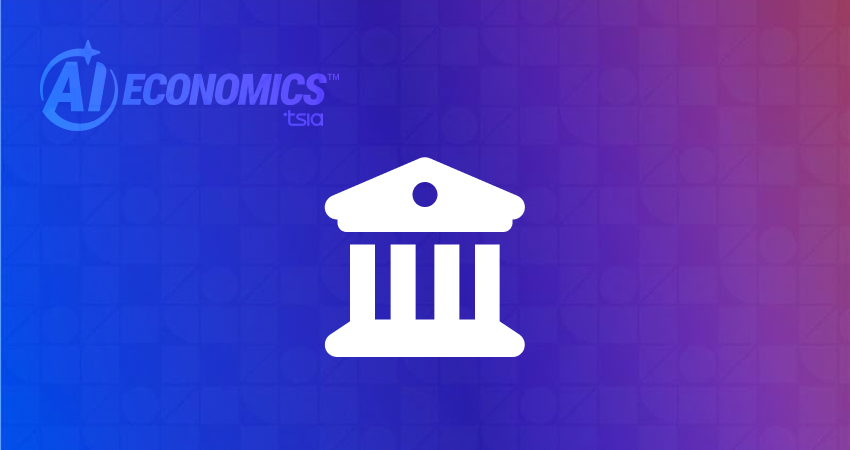In today's market, technology providers have the ability to collect more data from their customers than ever before. With that, we have the best chance in a generation to optimize value realization for customers and capture value for our efforts. But across this industry, those of us creating service offer portfolios struggle to embrace the full complexity of our customer's business challenges and deliver tangible value. The responsibility for customer value realization has shifted rapidly toward technology providers, an effect accelerated by the shift to cloud-based technologies and outcome-based business models in B2C markets. Ten years ago, revenue flowing from technology was double the revenue flowing from services; that relationship is now flipped, with services dominating the market. We've spent that decade growing businesses around complex technology, with massive sales organizations and attached services. However, our customers often do not consume the value promised, or are left with a feeling that there is a gap in the value promised. At our annual Technology & Services World (TSW) conference last month, J.B. Wood, TSIA’s President and CEO, challenged us to rise to the second wave of digital transformation. This will demand a renewed effort to reduce complexity in our customers' experience. Creating Compelling Service Offers. So what does this mean for the service offer manager? Simply put: we need to create service portfolios that are more simple, more standard, and more scalable. How do we balance customer choice against the complexity of our current portfolios? With a formal offer management process that focuses on more effective market discovery, better alignment across business units, and tangibly measuring customer value.

But even if you know what goes into a compelling offer, the question remains: how do you achieve those things? Many companies still struggle with how to execute these best practices and communicate value realization to their customers. Why is that? As I discussed these themes with TSIA members recently, my brain kept popping back to the idea that empathy just might be the superpower we need most in service offer management.
Growing Focus on Empathy in the Tech World
If you think you've been seeing a lot more focus on empathy, you're right! Google searches for "empathy" are near the all-time high, peaking in September 2020.

I was inspired to research how empathy relates to the business world after reading a Forbes article by sociologist and author Traci Brower. Dr. Brower references a handful of relevant studies on the tangible impact of empathy in business environments. She demonstrates how employees who perceive their leaders as empathetic enjoy a greater level of mental health, are much more likely to be innovative and engaged, and are much more cooperative in collective endeavors. Empathy fosters empathy and supports increased diversity. Increasing the diversity of our teams unlocks new perspectives and helps us connect more effectively to our markets.
Empathy may not be a brand new skill, but it has a new level of importance and the fresh research makes it especially clear how empathy is the leadership competency to develop and demonstrate now and in the future of work. - Dr. Tracy Brower, author of The Secrets to Happiness at Work
Since empathy supports a more diverse working team, it creates a sort of diversity-empathy positive feedback loop. With diversity a consistent challenge in the tech space, employing empathy is a way to combat that roadblock and stand out. By making diversity a priority, you not only grow diversity in your company, but also draw top talent to your team.
How to Employ Empathy in Your Service Offers
Returning our focus to service offer management specifically, we can harness the power of empathy as we focus on market discovery, charter alignment, and tangible customer value. Market discovery: Our segmented view of the market ultimately comes from deeper empathy with customer challenges. The more we know, the more empathy we can show. Exercises like service offer journey mapping and outcome engineering can help us understand the customer’s perspective and identify where and how value realization is falling short. This will likely require you to have deeper conversations with customers directly, conducting interviews and surveys with customers to better understand things from their point of view. Charter alignment: So often I see companies struggling with "internal competition," with offers from two or more business unit "silos" addressing the same market. They approach customers with different solutions and conflicting value propositions despite working for the same organization. This can be confusing for the customer, and often results in your value getting lost in the shuffle. One reason this happens is that each unit focuses solely on their own team’s goals, creating a silo effect and lack of understanding of other units’ motivations. But this is the time for joint ventures--for building bridges between service lines and offer teams. This is the time for technology product management and service offer management to align on offer development projects to build solutions that bring the technology, the data and analytics, and the services together in new creative ways. Creating tighter alignment across increasingly complex and diverse human teams is going to require more empathy in order to understand the other team’s goals and stack hands on solutions that work for the company as a whole. Tangible value: While it’s easy to understand how empathy can help us refine our view of customer challenges and tighten our cross-team alignment, the ultimate test is our ability to collectively deliver value to our customers. Service offer leaders play a critical role in orchestrating this outcome, putting together simpler, more standard customer outcomes in harmony with their delivery and go-to-market counterparts. But how does empathy play into that? Creating value we can measure across every stage of the customer lifecycle requires us to understand where the tangible value is for our customers. Walking in their shoes is not just about understanding their challenges, but also knowing their company and market well enough to increase our value to them. What does tangible value look like to your customers? What outcomes are your customers aiming for, and how can you assemble service offer management around that? Again, empathy is crucial to success.
Put Empathy in Action Today
While this is by no means a comprehensive look at empathy in the workplace, there are some key takeaways that you can start to implement.
Embrace empathy as a business skill and use it to...
- Increase team diversity and further accelerate understanding and collaboration
- Understand where value realization is getting lost
- Create tighter offer/market fit and operational alignment
- Map customer outcomes as an ongoing, standard activity
Smart Tip: Embrace Data-Driven Decision Making
Making smart, informed decisions is more crucial than ever. Leveraging TSIA’s in-depth insights and data-driven frameworks can help you navigate industry shifts confidently. Remember, in a world driven by artificial intelligence and digital transformation, the key to sustained success lies in making strategic decisions informed by reliable data, ensuring your role as a leader in your industry.










